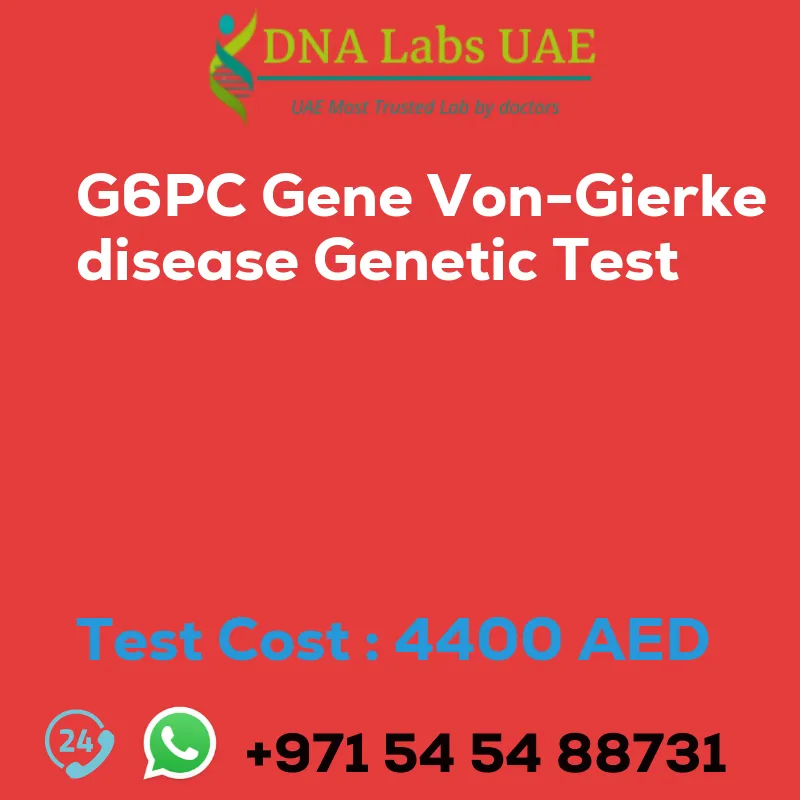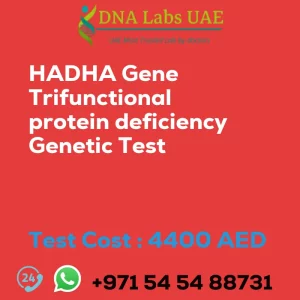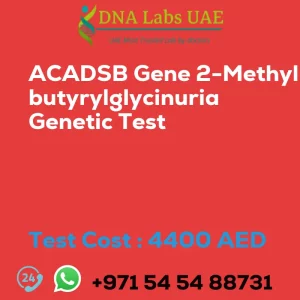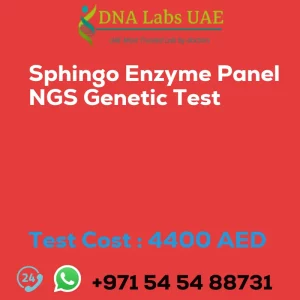G6PC Gene Von-Gierke Disease Genetic Test
Test Name: G6PC Gene Von-Gierke Disease Genetic Test
Components: Blood or Extracted DNA or One drop Blood on FTA Card
Price: 4400.0 AED
Report Delivery: 3 to 4 Weeks
Method: NGS Technology
Test Type: Metabolic Disorders
Doctor: General Physician
Test Department: Genetics
Pre Test Information: Clinical History of Patient who is going for G6PC Gene Von-Gierke Disease NGS Genetic DNA Test. A Genetic Counselling session to draw a pedigree chart of family members affected with Von-Gierke Disease.
Introduction to G6PC Gene Von-Gierke Disease Genetic Test
The G6PC gene is responsible for encoding an enzyme called glucose-6-phosphatase, which plays a crucial role in glucose metabolism. Mutations in this gene can lead to a rare genetic disorder known as Von Gierke Disease or Glycogen Storage Disease Type Ia (GSD Ia).
Von Gierke Disease is an autosomal recessive disorder characterized by the inability of the body to break down glycogen into glucose, resulting in a buildup of glycogen in various organs and tissues. This leads to symptoms such as severe hypoglycemia (low blood sugar), hepatomegaly (enlarged liver), growth retardation, and metabolic abnormalities.
NGS Technology for Genetic Testing
NGS (Next-Generation Sequencing) is a high-throughput DNA sequencing technology that allows for the rapid and cost-effective analysis of multiple genes simultaneously. In the context of Von Gierke Disease, NGS can be used as a genetic test to identify mutations in the G6PC gene that are associated with the disorder.
NGS-based genetic testing for Von Gierke Disease involves sequencing the entire coding region of the G6PC gene, as well as certain non-coding regions that are known to harbor disease-causing mutations. The DNA sample is typically obtained from a blood or saliva sample.
By identifying the specific mutations in the G6PC gene, NGS testing can provide a definitive diagnosis of Von Gierke Disease. This information is crucial for guiding treatment decisions and providing appropriate genetic counseling to affected individuals and their families.
It is important to note that NGS testing may not detect all possible mutations in the G6PC gene, as new mutations are continuously being discovered. Therefore, in some cases, additional genetic testing methods may be necessary to confirm the diagnosis. Additionally, genetic testing should always be accompanied by a thorough clinical evaluation to ensure accurate interpretation of the results.
| Test Name | G6PC Gene Von-Gierke disease Genetic Test |
|---|---|
| Components | |
| Price | 4400.0 AED |
| Sample Condition | Blood or Extracted DNA or One drop Blood on FTA Card |
| Report Delivery | 3 to 4 Weeks |
| Method | NGS Technology |
| Test type | Metabolic Disorders |
| Doctor | General Physician |
| Test Department: | Genetics |
| Pre Test Information | Clinical History of Patient who is going for G6PC Gene Von-Gierke disease NGS Genetic DNA Test A Genetic Counselling session to draw a pedigree chart of family members affected with Von-Gierke disease |
| Test Details |
The G6PC gene is responsible for encoding an enzyme called glucose-6-phosphatase, which plays a crucial role in glucose metabolism. Mutations in this gene can lead to a rare genetic disorder known as Von Gierke disease or glycogen storage disease type Ia (GSD Ia). Von Gierke disease is an autosomal recessive disorder characterized by the inability of the body to break down glycogen into glucose, resulting in a buildup of glycogen in various organs and tissues. This leads to symptoms such as severe hypoglycemia (low blood sugar), hepatomegaly (enlarged liver), growth retardation, and metabolic abnormalities. NGS (Next-Generation Sequencing) is a high-throughput DNA sequencing technology that allows for the rapid and cost-effective analysis of multiple genes simultaneously. In the context of Von Gierke disease, NGS can be used as a genetic test to identify mutations in the G6PC gene that are associated with the disorder. NGS-based genetic testing for Von Gierke disease involves sequencing the entire coding region of the G6PC gene, as well as certain non-coding regions that are known to harbor disease-causing mutations. The DNA sample is typically obtained from a blood or saliva sample. By identifying the specific mutations in the G6PC gene, NGS testing can provide a definitive diagnosis of Von Gierke disease. This information is crucial for guiding treatment decisions and providing appropriate genetic counseling to affected individuals and their families. It is important to note that NGS testing may not detect all possible mutations in the G6PC gene, as new mutations are continuously being discovered. Therefore, in some cases, additional genetic testing methods may be necessary to confirm the diagnosis. Additionally, genetic testing should always be accompanied by a thorough clinical evaluation to ensure accurate interpretation of the results. |








